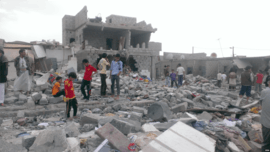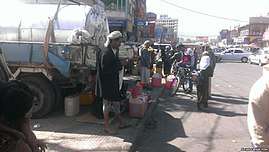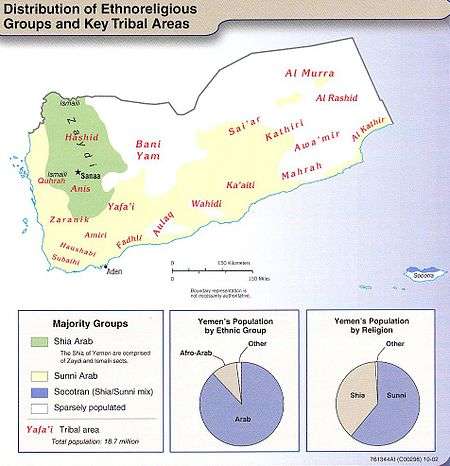Blockade of Yemen
The blockade of Yemen refers to a sea, land and air blockade on Yemen which started with the positioning of Saudi Arabian warships in Yemeni waters in 2015 with the Saudi invasion of Yemen. The United States joined the blockade in October 2016.[1] In November 2017, after a Houthi missile heading towards King Khalid International Airport was intercepted,[2] the Saudi-led military coalition stated it would close all sea land and air ports to Yemen,[3] but shortly began reopening them after criticism from the United Nations (UN) and over 20 aid groups.[4] The blockade of Yemen has resulted in widespread starvation, to the extent that the United Nations has raised concerns about the possibility of it becoming the deadliest famine in decades.[5][6] The World Health Organization announced that the number of suspected persons with cholera in Yemen reached approximately 500,000 people.[7][8]
.jpg)
Background

A military intervention was launched by Saudi Arabia in March, 2015, which was leading a coalition of nine countries from the Middle East and Africa, in order to influence the outcome of the Yemeni Civil War in favor of President Abdrabbuh Mansur Hadi’s government.[9]
The intervention code-named “Operation Decisive Storm” included a bombing campaign and subsequently saw a naval blockade and likewise deploying ground forces in Yemen.[10] As a result of that, there have been many innocent women and children killed as well as Houthi fighters.[11][12]
Supply shortage

As a result of the blockade there is a desperate shortage of necessary supplies such as food, water and medical supplies, to the extent that children are at risk of disease due to lack of drinkable water.[13]
A limited number of aid ships can unload, and the bulk of commercial shipping, on which the desperately poor country depends, is being blocked, creating a state of emergency for Yemenis.[14] In spite of entreaties, Saudi Arabia has failed to pay out any of the $274 million it promised to invest into humanitarian relief.[15][16]
United States's role
.jpg)
U.S. President Trump asked Saudi Arabia to allow humanitarian aid to enter Yemen in 2017.[17][18] However, the U.S has supported the Arab coalition's intervention in the war and its blockade of Yemen since March 2015. In mid-2015, Washington increased its logistical and intelligence support to Saudi Arabia by creating a joint coordination planning cell with the Saudi military that is helping manage the war.[19][20] However, in mid-2016 and amid escalating, international concerns regarding some of the strategic initiatives undertaken by the Saudi Arabian military in the conflict, the U.S. pulled back significantly on their participation in this joint planning cell, reducing its staff commitment to only five US workers.[21] Meanwhile, aid agencies say the embargo imposed by the U.S. (and UK-backed) Arab coalition has had dramatic effect with about 80% of population in urgent need of vital resources such as food, water and medical supplies. Saudi Arabia, reportedly relying on U.S. intelligence reports and surveillance images for target selection, began airstrikes, some of which were against weapons and aircraft. The US has dispatched warships to reinforce the blockade.[22] According to Iranian sources, it has refueled Saudi planes, sent the Saudi military targeting intelligence, and resupplied them with tens of billions of dollars worth of bombs.[14][20] The U.S. (and the UK) support the effort through arms sales and technical assistance. Amnesty International urged the U.S. and the UK to stop supplying arms to Saudi Arabia and to the Saudi-led coalition.[23][24] It has been reported that U.S. is regarded as an indirect partner for Saudi Arabia in the war and blockade on Yemen.[25]
United Kingdom's role
Although Britain has called on Saudi Arabia to ease the siege on Yemen and the British government allocated 4 million pounds to aid meet emergency requirements,[26][27] the UK government has officially supported the Saudi-led coalition since the beginning of the conflict.[28]
In 2015 the then Foreign Secretary, the Rt Hon Philip Hammond MP, confirmed that the Saudis were using UK-manufactured aircraft and weaponry in Yemen and set out the extent of UK support for Saudi Arabia: "We have a significant infrastructure supporting the Saudi air force generally and if we are requested to provide them with enhanced support—spare parts, maintenance, technical advice, resupply—we will seek to do so. We’ll support the Saudis in every practical way short of engaging in combat."[29]
In 2018 UN experts called on the UK government to stop giving Saudi Arabia bombs to use in Yemen.
In a 2019 Guardian article titled: "The Saudis couldn’t do it without us’: the UK's true role in Yemen's deadly war"[30] Journalist Arron Merat explains: "Every day Yemen is hit by British bombs – dropped by British planes that are flown by British-trained pilots and maintained and prepared inside Saudi Arabia by thousands of British contractors."
Merat makes it clear that: "Britain does not merely supply weapons for this war: it provides the personnel and expertise required to keep the war going. The British government has deployed RAF personnel to work as engineers, and to train Saudi pilots and targeteers – while an even larger role is played by BAE Systems, Britain’s biggest arms company, which the government has subcontracted to provide weapons, maintenance and engineers inside Saudi Arabia."[30]
In 2019 a Channel 4 documentary film named: "Britain's Hidden War: Channel 4 Dispatches", a former BAE Systems worker revealed that the Royal Saudi Air Force (RSAF) would be unable to fly its fleet of Typhoon fighter jets without BAE's support; the former BAE worker explained: “With the amount of aircraft they’ve got and the operational demands, if we weren’t there in 7 to 14 days there wouldn’t be a jet in the sky.”[31]
United Nations reaction
According to Agence France-Presse, The United Nations called Saudi-led coalition to instantly/completely lift the blockage on Yemen. The World Health Organization announced that there is a rapid incidence of diphtheria disease in 13 provinces of Yemen. This organization also added, the incidence of diphtheria in Yemen is regarded as a worrying problem.[32] The Saudi Arabian-led coalition blocked all sea, land and air borders of Yemen after Ansar Allah's missile attack on Riyadh on 6 November 2017, and did not allow international aid to be delivered for Yemeni people.[33]
According to Iranian reports, there are approximately one million Yemenis who have been affected by cholera, and more than 2200 people died due to the disease,[32] this led to protests against the blockade where the United Nations appealed to the Saudi Arabian-led military coalition to entirely lift its blockade of Yemen, saying up to 8 million people were “right on the brink of famine”.[33]
Port blockade
Although Saudi Arabia pledged on 20 December 2017 to lift the blockade for a month,[34] there is no reported aid or commerce coming in Yemen via the port of Hudaydah which is considered as a key port in Yemen.[35] After Houthi fighters fired a missile at the capital of Saudi Arabia on 4 November 2017, Saudis sealed sea, air and land access to Yemen. Saudi officials did consent that they will lift the blockade of Hudaydah for a period of time. In the meanwhile, Riyadh mentioned that “The port of Hudaydah will remain open for humanitarian and relief supplies and the entry of commercial vessels, including fuel and food vessels, for a period of 30 days". Two weeks later, after Saudi Arabia's declaration, Hudaydah stayed empty. There is no relief vessels or trader to be seen anchored there. The manager of the port substantiated that the sea-hub did process merely two vessels whose permits were old.[36][37]
Houthi movement response
Abdul-Malik al-Houthi as the leader of Yemen's Ansar Allah (Houthi) movement has vowed retaliatory attacks in reaction to the blockade. Recently, al-Houthi protested against “tightening the blockade” by addressing the adherents of Houthis through television. Since, Saudi Arabia has imposed a hard blockade on about all the air, sea ports and land of Yemen after Yemenis launched a solid propellant and scud-type missile against the international airport of King Khalid which is located thirty-five kilometers north of Riyadh as the capital of Saudi, in reaction to Saudi Arabia's devastating aerial bombardment campaign over Yemenis. Abdul-Malik al-Houthi declared that they are aware that what (targets) could cause big trouble and of course how to reach them.[39][40]
The leader of Ansar Allah emphasized that Saudi Arabia and UAE are within range of the missiles, and Yemeni's UAVs will begin bombing the targets over Saudi Arabia. Abdul-Malik al-Houthi also warned the companies and investors who are in UAE that all companies in UAE ought not to consider United Arab Emirates as a safe country from now on. He also said to invaders that they ought not to commit aggression to Al-Hudaydah if they want to protect their oil tankers.[40][41]
Legal background
According to the international law of naval blockade the naval measures conducted by the coalition led by Saudi Arabia do not amount to a naval blockade in the legal sense.[42] It is said that neither the international law of contraband nor the United Nations Security Council Resolution 2216 of 14 April 2015 cover the extensive enforcement measures.[43] Due to the devastating famine in Yemen and supply shortage of essential goods, which are caused by the enforcement measures, the naval operations off the coast of Yemen are criticized as a violation of international humanitarian law.[44]
See also
References
- "US involvement in the Yemen war just got deeper". Public Radio International. Retrieved 2018-02-23.
- "Saudi Arabia: Missile intercepted near Riyadh". BBC News Services. 4 November 2017. Retrieved 24 June 2020.
- Westall, Sylvia; Nichols, Michelle; et al. (Reuters' Dubai newsroom) (5 November 2017). Kerry, Frances; Grebler, Dan; Peter, Peter (eds.). "Saudi-led forces close air, sea and land access to Yemen". Reuters. Dubai. Retrieved 24 June 2017.
- al-Haj, Ahmed (13 November 2017). "Yemen rebels vow escalation as Saudis look to relax blockade". Associated Press News. Sanaa. Retrieved 24 June 2017.
- Yemen conflict: UN official warns of world's biggest famine BBC News. Retrieved 13 December 2017.
- Employee of the Month: Mohamed bin Salman sites.tufts.edu Retrieved 24 December 2017.
- Saudi Arabia’s new blockade is starving Yemen vox.com. Retrieved 11 December 2017.
- A half million people in Yemen have been affected by Cholera BBC News. 12 December 2017
- Gulf Coalition Operations in Yemen (Part 1): The Ground War washingtoninstitute.org Retrieved 13 December 2017.
- Mohammed bin Salman's ill-advised ventures have weakened Saudi Arabia’s position in the world alalam.ir Retrieved 23 December 2017.
- Continuation of Saudi Arabia in Yemen www.irna.ir Retrieved 23 December 2017.
- Saudi blockade starves Yemen of vital supplies, as bombing raids continue independent.co.uk Retrieved 13 December 2017.
- Yemen conflict: human rights groups urge inquiry into Saudi coalition abuses theguardian.com Retrieved 7 January 2018
- "Saudi-led naval blockade leaves 20m Yemenis facing humanitarian disaster". www.theguardian.com. 23 Dec 2017.
- Saudi blockade leaves 20mn Yemeni in crisis worldbulletin.net Retrieved 7 January 2018
- Saudi Arabia fatally bombs ANOTHER Yemeni hospital + 18 Billion in US weapons + Bowie democraticunderground.org Retrieved 7 January 2018
- Trump asks Saudi Arabia to allow immediate aid to Yemen reuters.com Retrieved 25 December 2017.
- "درخواست ترامپ از عربستان سعودی درباره یمن - اخبار تسنیم | The request of Trump from KSA about Yemen". Tasnim. Retrieved 31 December 2017.
- Exclusive: U.S. expands intelligence sharing with Saudis in Yemen operation reuters.com Retrieved 7 January 2018
- "Saudi Arabia launches airstrikes in Yemen". edition.cnn.com. 13 January 2018.
- reuters.com Retrieved 22 September 2018
- In Yemen's "60 minutes" moment, no mention that the U.S. is fueling the conflict theintercept.com Retrieved 23 December 2017.
- Inside Yemen's forgotten war bbc.com Retrieved 25 December 2017.
- Amnesty International urges Britain to stop supplying arms to Saudi Arabia independent.co.uk Retrieved 25 December 2017.
- Saudi Arabia launches airstrikes in Yemen edition.cnn.com Retrieved 23 December 2017.
- Britain 'fuelling war in Yemen' through arms sales, says charity telegraph.co.uk Retrieved 23 December 2017.
- Theresa May: Saudi blockade on Yemen must be eased aljazeera.com Retrieved 23 December 2017.
- Foster, Peter (2015-03-27). "UK 'will support Saudi-led assault on Yemeni rebels - but not engaging in combat'". ISSN 0307-1235. Retrieved 2019-06-19.
- "House of Commons - The use of UK-manufactured arms in Yemen - Foreign Affairs Committee". publications.parliament.uk. Retrieved 2019-06-20.
- Merat, Arron (2019-06-18). "'The Saudis couldn't do it without us': the UK's true role in Yemen's deadly war". The Guardian. ISSN 0261-3077. Retrieved 2019-06-19.
- "Britain's Hidden War: Channel 4 Dispatches | Channel 4". www.channel4.com. Retrieved 2019-06-19.
- "United Nations calls for complete lifting of Saudi blockade". tasnimnews.com. 11 January 2018.
- "United Nations calls for complete lifting of Saudi blockade". reuters.com. 31 December 2017.
- No Ships in Yemen's Key Port Despite Saudi Arabia Claim of Lifting Blockade Archived 2018-01-08 at the Wayback Machine en.farsnews.com Retrieved 7 January 2018
- No ships in Yemen's key port despite Saudi claim of lifting blockade rt.com Retrieved 30 January 2018
- No ships in Yemen's key port despite Saudi claim of lifting blockade reddit.com Retrieved 7 January 2018
- NO SHIPS IN YEMEN’S KEY PORT DESPITE SAUDI CLAIM OF LIFTING BLOCKADE Archived 2018-01-07 at the Wayback Machine yemenpress.org Retrieved 7 January 2018
- M. Izady. "Yemen:Ethno-Religious Composition" Columbia University. 2014. Accessed 12 April 2015
- Saudi Arabia 'intercepts another Houthi missile' aljazeera.com Retrieved 7 January 2018
- "Yemen's Houthi leader threatens to hit back over Saudi blockade". presstv.com. 26 December 2017.
- Al-Houthi: Abu Dhabi and Riyadh are within range of Yemini missiles / the flight of UAVs over Saudi tasnimnews.com Retrieved 26 December 2017.
- Fink, Martin D. (2017-07-01). "Naval Blockade and the Humanitarian Crisis in Yemen". Netherlands International Law Review. 64 (2): 291–307. doi:10.1007/s40802-017-0092-3. ISSN 0165-070X.
- Daum, Oliver. "War in Yemen (1): Why the Saudi-led coalition's blockade is not a naval blockade". www.juwiss.de. Retrieved 2018-05-28.
- Daum, Oliver. "War in Yemen (2): Why the Saudi-led coalition has not obeyed the law of naval blockade and violates IHL". www.juwiss.de. Retrieved 2018-05-28.
.jpg)

